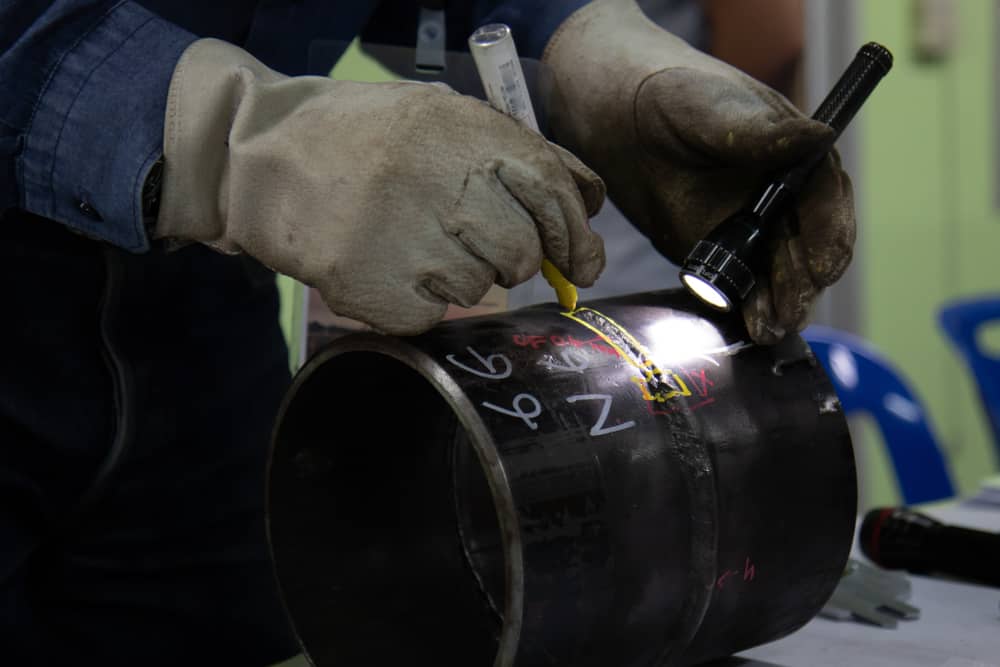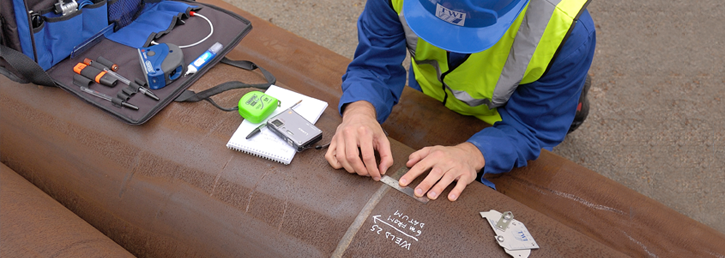How Welding Inspection Madison Makes Sure High Quality and Security in Fabrication
How Welding Inspection Madison Makes Sure High Quality and Security in Fabrication
Blog Article
The Importance of Thorough Welding Examination in Industrial Applications
In the world of industrial applications, the significance of thorough welding assessment can not be overstated. It plays an essential duty in guaranteeing the structural honesty and longevity of bonded elements. Advanced non-destructive testing strategies permit the early discovery of prospective defects, such as splits and incomplete blend, which, if left untreated, could lead to tragic failings. Furthermore, adherence to strict industry standards not just ensures top quality yet additionally develops client self-confidence. As we explore the complex benefits of attentive welding evaluations, one must think about the broader ramifications on safety and security, dependability, and cost-effectiveness in commercial operations.
Enhancing Architectural Integrity
When it comes to welding examination in commercial applications, improving structural integrity is extremely important. The key objective of welding evaluation is to ensure that the welds are qualified of bearing the expected anxieties and loads they will experience in service.
The importance of keeping structural integrity in bonded frameworks can not be overemphasized. Badly performed welds can lead to tragic failings, leading to pricey repair services, downtime, and even endangerment of human lives. Assessors play an important function in the lifecycle of commercial parts, giving assurance that the welding procedure delivers the wanted strength and toughness.
Moreover, advanced modern technologies, such as phased range ultrasonic screening and electronic radiography, offer improved capacities in spotting possible weak points, enabling restorative actions before problems rise. By focusing on the integrity of welds with careful inspection, markets can ensure operational efficiency and prolong the long life of their framework.
Identifying Welding Problems
Determining welding flaws is a crucial aspect of guaranteeing the security and integrity of bonded frameworks. These defects can compromise the stability of the entire assembly and, if left unaddressed, might cause tragic failings. Usual welding issues consist of porosity, splits, insufficient blend, and damaging. Each of these issues arises from specific causes, such as inappropriate welding strategies, contamination, or poor warmth control.

Skilled examiners make use of both visual evaluation and progressed non-destructive screening (NDT) methods, such as ultrasonic or radiographic screening, to identify these problems. The timely recognition and correction of welding defects are crucial to keep the architectural integrity and longevity of industrial elements.
Making Certain Compliance Criteria
Preserving the honesty of bonded frameworks extends beyond identifying problems; it needs adherence to rigid conformity requirements. Conformity with well-known standards, such as those provided by the American Welding Society (AWS) and the International Organization for Standardization (ISO), ensures that welds meet minimum security and top quality needs. These criteria incorporate a variety of criteria, including product specifications, welding procedures, and credentials of welders. Adherence to these standards her explanation is important to avoid structural failures, which could lead to devastating consequences in industrial applications.
Regular audits and examinations are vital in verifying conformity. Inspectors need to possess a detailed understanding of the relevant requirements and be adept at utilizing various non-destructive testing (NDT) approaches to assess weld top quality. By ensuring that welding methods straighten with compliance criteria, firms reduce the threat of non-conformity, which can lead to lawful liabilities and security threats.
Furthermore, keeping conformity not only safeguards structural stability yet also improves a business's reputation in the industry. Clients and stakeholders are most likely to count on firms that continually show a commitment to quality and security with strenuous conformity. Thus, ensuring compliance requirements is a critical component in the successful execution of welding in commercial applications.
Lowering Upkeep Prices

The application of advanced non-destructive screening (NDT) methods, consisting of ultrasonic, radiographic, and magnetic particle assessments, enhances the capacity to discover subsurface imperfections without jeopardizing the architectural stability of parts. By utilizing these strategies, industries can significantly prolong the life span of their devices, lowering downtime and the associated economic burden of maintenance tasks.
Additionally, a durable welding examination program sustains the optimization of maintenance routines, changing from responsive to predictive upkeep approaches. This proactive technique not just reduces unforeseen failings but also simplifies resource allowance, making certain that maintenance efforts are concentrated and reliable. Inevitably, the investment in extensive welding assessment is countered by the substantial savings recognized with lowered upkeep needs, adding favorably to the overall operational directory efficiency of industrial business.
Improving Precaution
Welding examination plays a critical duty in this context, as it makes certain that all joints and links fulfill rigid safety criteria. Comprehensive inspections help identify problems such as fractures, porosity, or insufficient combination that could endanger architectural integrity.
To boost security measures, taking on innovative non-destructive screening (NDT) methods is crucial. Techniques like ultrasonic testing, radiographic screening, and magnetic particle examination enable comprehensive exam without damaging the framework. These innovations enable examiners to detect surprise defects early in the construction process, facilitating timely rehabilitative actions. In addition, executing a durable quality assurance system that consists of normal training for welders and assessors guarantees adherence to developed security criteria.
Last but not least, fostering a culture of safety within the organization highlights the value of detailed welding inspections. Encouraging open communication and collaboration among welders, designers, and assessors adds to a common commitment to security excellence. Welding Inspection Madison. In doing so, industries can safeguard their operations, protect employees, and keep public trust fund

Final Thought
Complete welding inspection is crucial in industrial applications, considerably enhancing structural honesty and dependability. Inevitably, the diligent execution of welding examinations plays an important duty in maintaining operational performance and safety in industrial setups.
As we discover the multifaceted benefits of thorough welding examinations, one must take into consideration the more comprehensive implications on security, integrity, and cost-effectiveness in commercial procedures.
The primary goal of welding assessment is to make certain that the welds are qualified of bearing the expected stress and anxieties and lots they will encounter in service. Efficient welding assessment plays an indispensable duty in minimizing these costs by ensuring the integrity and longevity of welds, thus reducing the danger of premature failures.Extensive welding assessment is crucial in commercial applications, dramatically boosting architectural stability and dependability. Eventually, the persistent execution of welding inspections plays an essential role in maintaining operational efficiency and safety in commercial setups.
Report this page